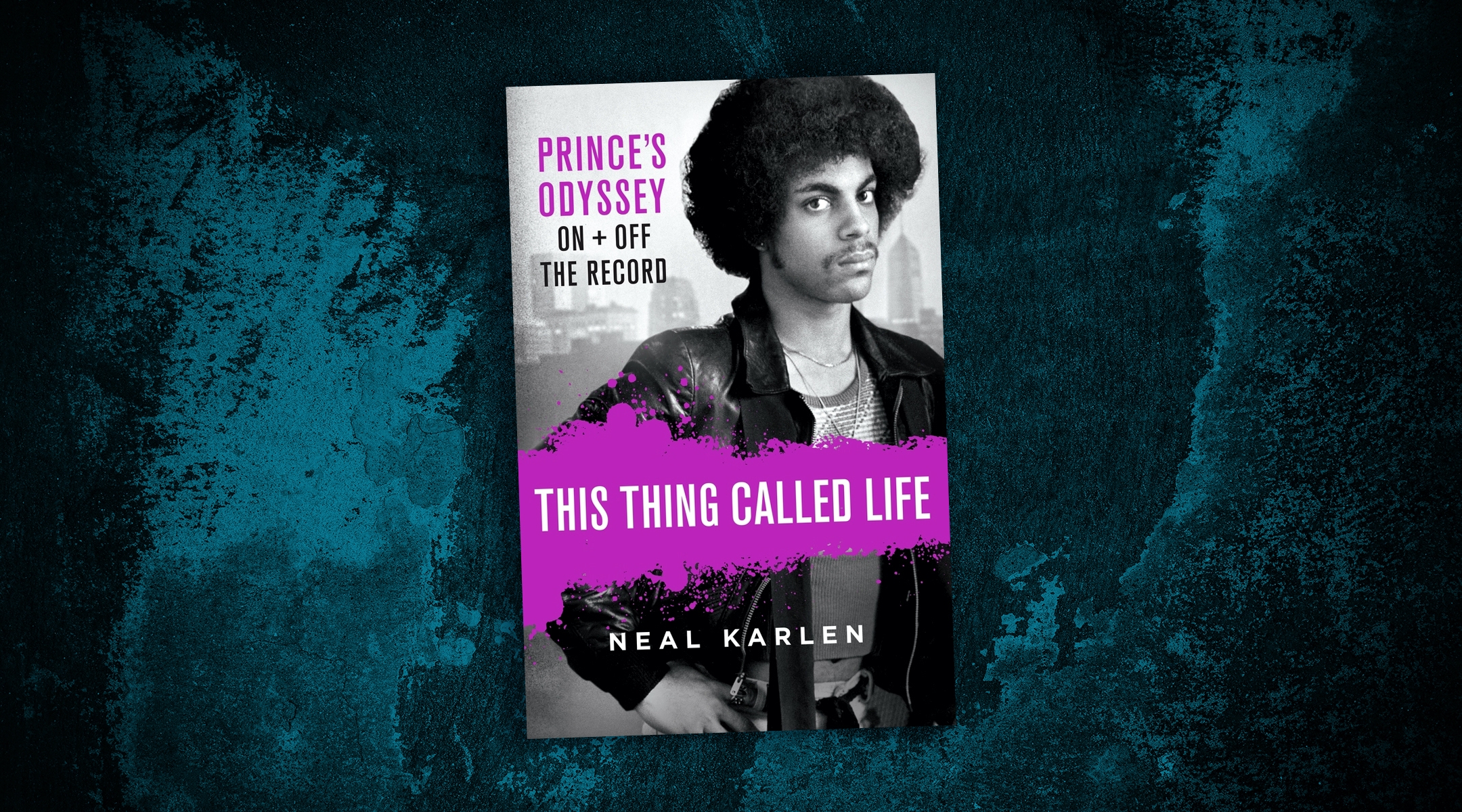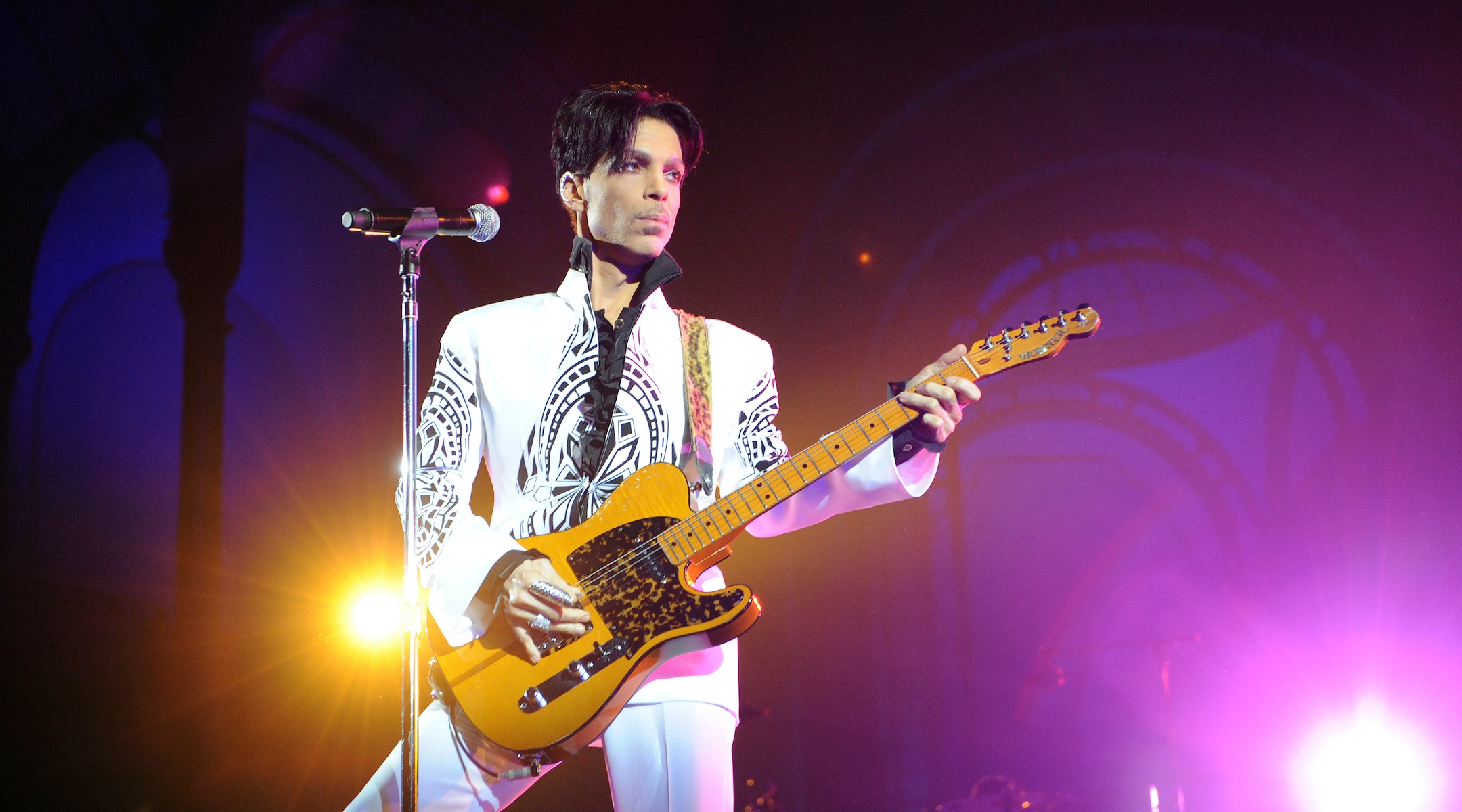(JTA) — In the late 1960s, when Neal Karlen was not even 10 years old, he would spend time at the home of his grandparents, one of the few Jewish families that remained on the north side of Minneapolis. Karlen would play basketball and ride bikes with a group of African-American kids who lived in the neighborhood. One of them, he later realized, was a young Prince Rogers Nelson.
The two men would reconnect in the early 1980s, when Karlen was a magazine journalist and Prince one of the world’s most famous rock stars. Karlen wrote three Rolling Stone cover stories about the singer, some of them published at times when Prince wasn’t speaking to any other reporters. Karlen went on to collaborate with Prince on the 1994 direct-to-video rock opera “3 Chains o’ Gold” — which Karlen notes received “the worst reviews of anything [Prince] ever did” — and was eventually hired to write the singer’s “final testament,” which was said to have been buried in a time capsule on the grounds of Paisley Park, Prince’s legendary home and production facility southwest of Minneapolis.
“We were very similar, except that he was an international icon and I was some schmuck from St. Louis Park,” Karlen told the Jewish Telegraphic Agency.
Long after they stopped working together, Karlen and Prince remained in contact, speaking for the final time just weeks before Prince’s death in 2016 at the age of 57. Now, Karlen has published “This Thing Called Life: Prince’s Odyssey, On and Off the Record,” a memoir of his relationship with the enigmatic superstar.
“I was taking notes all the time,” Karlen said of the last years of his friendship with Prince. “But I didn’t know what it was for.”
What it was for turned out to be a mournful remembrance that provides new insight into the torments and mysteries of one of the most successful popular musicians of modern times. It also details a surprising number of connections between Prince and Judaism.
Prince had several Jews in his close circle, including several members of his best-known band, The Revolution. He was interested in a long list of Jewish subjects, including golems, dybbuks and the gangster Meyer Lansky. He was a huge fan of the television show “Seinfeld” and “The Big Lebowski,” the cult film in which John Goodman plays a Jewish Vietnam veteran who famously refuses to bowl on the Jewish sabbath. And Prince tagged along for meetings with rabbis conducted as part of Karlen’s research for his books.
“He liked Jews,” said Karlen, 60, who has authored several books with Jewish themes. “He did. Half the Revolution was Jewish. The guy who discovered him, Owen Husney, was Jewish. Mo Ostin and Lenny Waronker, who he really liked, his guys at Warner Brothers, were Jewish. He knew Jews, he liked them.”

The cover of Karlen’s book. (Macmillan)
But there was at least one ugly moment in Prince’s history with Jews, which Karlen discusses in the book: In the early 2000s, when a Revolution reunion was being proposed, Prince is said to have asked Wendy Melvoin, a key member of his band in the 1980s, to renounce her Judaism. Prince confirmed to Karlen that this was true.
“He may have just been just being an asshole that day,” Karlen says. “He could hurt people, and not realize it …. he just didn’t get that you shouldn’t turn your back on the people who love you. And I think those are the people who did love him, and why he really was alone at the end.”
The author of eight other books, Karlen couldn’t bring himself to listen to the tapes of his conversations with Prince for a long time after the singer’s death. Instead, he spent a year reading what others had written about Prince — everything except his own notes.
In the time between Prince’s death and the publication of the book, Karlen himself went through a great deal of personal trauma. His father died last September, and in April of 2017, nearly a year to the day after Prince’s death, he lost nearly all of his possessions in a fire. Luckily for him, the audio of his old interviews with Prince and other notes had been digitized just weeks earlier.
“I lost everything but my Prince stuff,” he said.
Karlen notes repeatedly in the book that Prince was very much unknowable, even to those who were close to him. Though he had long been vocal about hating drugs and even looked down on those who used them, Prince privately battled an opioid dependency that would eventually kill him. And like fellow Minnesotan Bob Dylan, he made a habit of saying things to the press about his upbringing that were contradictory or even outright untrue.
“He was inventing himself,” Karlen said. “The easiest way to reinvent yourself is to pretend you had no past.”
Karlen’s book also explores how Prince was shaped by the “Minnesota nice” stereotype of mild manners and passive aggression and how the state can often be an inhospitable place to those outside the dominant Scandinavian culture. Much of the music legend’s life was marred by his hostile relationship with his father and the death of his only child in 1996 — a tragedy, Karlen convincingly argues, Prince never really got over. Prince also had strained relationships with band members and his family, and he ended up dying alone at Paisley Park — the exact fate he had long feared.
“It breaks my heart, because I really did like him as a guy, but he was broken,” Karlen said. “I think his father did it, and I think it broke him as a human being, but it also sort is what propelled him into the next stratosphere…. I just wish he’d been happier more often.”
JTA has documented Jewish history in real-time for over a century. Keep our journalism strong by joining us in supporting independent, award-winning reporting.






